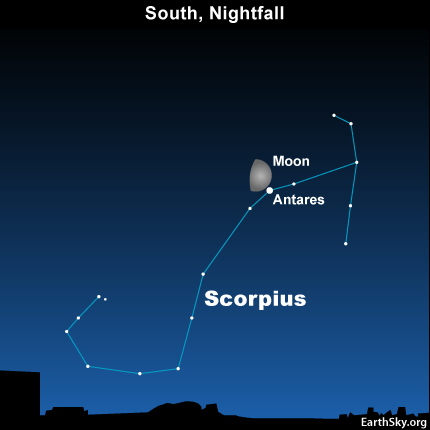Courtesy of EarthSky
A Clear Voice for Science
www.EarthSky.org

 You have got about another month to see a uniquely summer star, Antares in the constellation Scorpius, in the evening. It is the brightest star near the waxing gibbous moon tonight, in the southern sky as night begins. The moon and Antares will drift westward throughout the night, to set around midnight.
You have got about another month to see a uniquely summer star, Antares in the constellation Scorpius, in the evening. It is the brightest star near the waxing gibbous moon tonight, in the southern sky as night begins. The moon and Antares will drift westward throughout the night, to set around midnight.
Antares sets some 4 minutes earlier with each passing night. By late September, Antares will be tough to spot in the southwestern twilight after sunset.
In ancient Chinese thought, the summer season was associated with the direction south, with the element fire, and with the color red. No wonder, then, that this reddish star in the south – beautiful Antares – was considered the Fire Star of the ancient Chinese.
To us in the northern hemisphere, Antares appears as a bright reddish star that rides relatively low in the south all summer. We know it as a great ball of gases, a thermonuclear cauldron radiating unimaginable amounts of energy into the blackness and vastness of space.
Yet, to us – as to the ancient Chinese – Antares appears so near the southern horizon that we must view it through a great thickness of air. The air through which we view Antares causes this star to twinkle rapidly! On any summer evening, if you see a bright red star low in the south that’s twinkling fiercely . . . it’s probably Antares.
Written by Deborah Byrd
Astronomy Picture of the Day from NASA/JPL
U.S. Naval Observator Astronomical Information center
The York County Astronomical Society
 Print This Post
Print This Post








